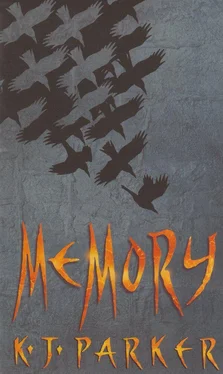K Parker - Memory
Здесь есть возможность читать онлайн «K Parker - Memory» весь текст электронной книги совершенно бесплатно (целиком полную версию без сокращений). В некоторых случаях можно слушать аудио, скачать через торрент в формате fb2 и присутствует краткое содержание. Жанр: Фэнтези, на английском языке. Описание произведения, (предисловие) а так же отзывы посетителей доступны на портале библиотеки ЛибКат.
- Название:Memory
- Автор:
- Жанр:
- Год:неизвестен
- ISBN:нет данных
- Рейтинг книги:5 / 5. Голосов: 1
-
Избранное:Добавить в избранное
- Отзывы:
-
Ваша оценка:
- 100
- 1
- 2
- 3
- 4
- 5
Memory: краткое содержание, описание и аннотация
Предлагаем к чтению аннотацию, описание, краткое содержание или предисловие (зависит от того, что написал сам автор книги «Memory»). Если вы не нашли необходимую информацию о книге — напишите в комментариях, мы постараемся отыскать её.
Memory — читать онлайн бесплатно полную книгу (весь текст) целиком
Ниже представлен текст книги, разбитый по страницам. Система сохранения места последней прочитанной страницы, позволяет с удобством читать онлайн бесплатно книгу «Memory», без необходимости каждый раз заново искать на чём Вы остановились. Поставьте закладку, и сможете в любой момент перейти на страницу, на которой закончили чтение.
Интервал:
Закладка:
It was a moment before Poldarn managed to figure out what she was talking about. She went on: 'It's just as well Gain's with me, I honestly don't think I'd have recognised you; except, of course, I knew I was looking for a man with a horribly burned face. And your voice is the same. I guess I'd know it anywhere. But what the hell are you doing out here? You never did have any consideration. All the trouble we've been to, just so we'd meet you at Dui Chirra, and you weren't even bloody well there.'
So that was it, the question answered. Gain had been telling the truth. Poldarn felt as though he'd walked across a desert, just to find himself back where he'd started from. 'I don't understand,' he said.
For some reason, they both found that highly amusing. 'It's all right,' Gain said, 'you aren't supposed to. And besides, your sensibilities are probably the least important thing in the whole world right now. Isn't that right, Xipho?'
'Yes.' She took one hand off the reins to wipe rainwater out of her eyes. 'A bit like old times, really; except that this time we're the ones who know what's going on, and you aren't. Shall we tell him, Gain, or would it be more fun to let him sweat for a while?'
'Probably,' Gain replied. 'But remember who we've got here-the most slippery boy in the whole school. Got to do something to keep him from running away. Either we bash him over the head and tie him up, or we tell him a story. What do you reckon?'
'Tell him the story,' Copis replied. 'I haven't got the energy to play games.'
While they were talking, Poldarn was figuring out the chances of getting away: a sitting jump off the box into the mud, followed by a frantic sprint for the cover of the trees. If only he could get a few yards into the forest, he felt sure he could lose them, but in order to get that far he'd have to be faster, cleverer for two whole seconds, maybe even three. It'd be like trying to outdraw two sword-monks simultaneously. Might as well try to escape drowning in a river by strangling it with his bare hands.
He turned and looked Gain Aciava in the eye. 'All that stuff you told me,' he said. 'Was it true?'
Gain grinned. 'Would I lie to you? I never have yet. And I've known you since you were seventeen.'
'I've lied to you a lot,' Copis put in. 'But Gain's not like me. Painfully straightforward. Did he tell you what he's been doing for a living lately? Selling false teeth?'
Poldarn looked at both of them. He was quick, he had reflexes that could only be explained by reference to religion, fast and accurate enough to knock a flying crow out of the air with a stone. But not quick enough. 'Who are you?' he asked. 'And why were you looking for me?'
In the end, it was a straightforward race: a quarter-mile dash through the mud, carts on one side, horsemen on the other. The carts won, by a whisker; all but two of them made it in through the gate before Brigadier Muno's outriders could intercept them. The two stragglers were cut off only yards from the stockade, but the defenders had no choice but to slam the gates in their faces, whereupon the riders surged round them like the incoming tide.
Fine, Monach said to himself, as he watched from the picket tower, it'll have to be a siege, then. I've never done a siege before, it'll be a new experience for me.
At least he was off to a good start, thanks to some appallingly bad judgement on the part of the supply-team drivers, who hadn't realised that Muno's people were, like themselves, government troops. The first they'd known of their mistake was when they'd thundered in through the gates and noticed that the armed men cheering them on and grinning were a bit too scruffy for regular soldiers. Then the gates swept shut, and the garrison men were jumping up on the carts, grabbing the drivers, twisting their arms behind their backs, and it was too late to get away. Monach couldn't help feeling just a little bit sorry for them.
And grateful, too; if they hadn't driven that last couple of miles with breathtaking skill and desperate courage, any further resistance on his part would've been out of the question. Even now, he only had enough supplies to last three weeks, four at the very most; but he had a shrewd suspicion that Muno was probably even worse off in that respect than he was. In Tulice in the wet season, a loaf in the stores was worth a bushel in a supply depot fifty miles away down swamped and flooded roads. Back in sixth grade, they'd been taught a reliable mathematical formula for calculating the probabilities of success in a siege. Assuming he'd remembered it correctly and his data was accurate, the odds were fifty-six to forty-four in his favour; so that was all right The bad thing about sieges, Monach rapidly discovered, was the overwhelming amount of administration they entailed. Guard shifts, rations, working parties to secure the defences; officers of the day, officers in charge of supply, officers reporting to other officers reporting to him. Proper soldiers, of course, were trained for this sort of thing and took it in their stride; but he wasn't a proper soldier, he was a sword-monk, and all he really knew about was pulling a sword out of a scabbard. If he'd wanted to be a clerk, he'd have stayed home and gone into the dried-fish business.
Fortunately, Monach soon discovered, he had an ally. Exactly how Spenno the pattern-maker had come to hate the government so much, he wasn't quite sure, though as far as he could tell it was mostly to do with the titanic clash of personalities between himself and the admittedly insufferable Galand Dev. In any event, Spenno was if anything even more determined than he was that Brigadier Muno shouldn't recapture the Dui Chirra foundry; and whereas Monach was a mere warlord, Spenno was a foreman-the same degree of difference, he soon realised, as between cast iron and tempered steel. From the moment when Monach found the courage to abdicate responsibility for the defence of Dui Chirra and let Spenno get on with it, everything seemed to flow as smoothly as a coil of tangled rope teased patiently apart by an expert. Within the hour, teams of efficient workers (foundrymen, Monach couldn't help noticing, rather than his somewhat temperamental and unreliable fellow warriors) were stacking flour barrels, carrying planks of wood and buckets of nails, and hauling carts and wheelbarrows through the standing pools of rainwater in the yard. He had no idea what they were doing; but they did, which was all that mattered. Shaking his head, he went back up the picket tower, to watch the antlike scurrying and listen to the distant but clearly audible sound of Spenno's fluent, musical swearing.
On the other side of the stockade, Monach observed with great pleasure, things didn't seem to be going nearly as well. Brigadier Muno-he recognised him at once by his fine full-length blue cloak-stood in the centre of a buzzing cloud of staff officers, like an azure cow-pat surrounded by flies; but not much work seemed to be getting done. His soldiers were either leaning on their spears or sitting on their shields in the mud, not even bothering to try and find shelter from the pelting rain. Best of all, he had a clear view of Muno's store-tents. Unless he'd arranged for a substantial supply train to follow on after him, Muno was only a few days away from starvation-and even if a hundred heavy wagons laden with flour and biscuits were already on their way, their chances of getting through were poor and getting worse with every gallon of water that fell out of the sky. Another thing Muno seemed to have forgotten in his haste to get underway was a sufficiency of tents. Monach looked up at the thick banks of iron-grey clouds piling in from the south and, for the first time he could remember, thanked the gods for rain: so much deadlier, he couldn't help thinking, than a monk's sword, or even a backsabre.
Читать дальшеИнтервал:
Закладка:
Похожие книги на «Memory»
Представляем Вашему вниманию похожие книги на «Memory» списком для выбора. Мы отобрали схожую по названию и смыслу литературу в надежде предоставить читателям больше вариантов отыскать новые, интересные, ещё непрочитанные произведения.
Обсуждение, отзывы о книге «Memory» и просто собственные мнения читателей. Оставьте ваши комментарии, напишите, что Вы думаете о произведении, его смысле или главных героях. Укажите что конкретно понравилось, а что нет, и почему Вы так считаете.












